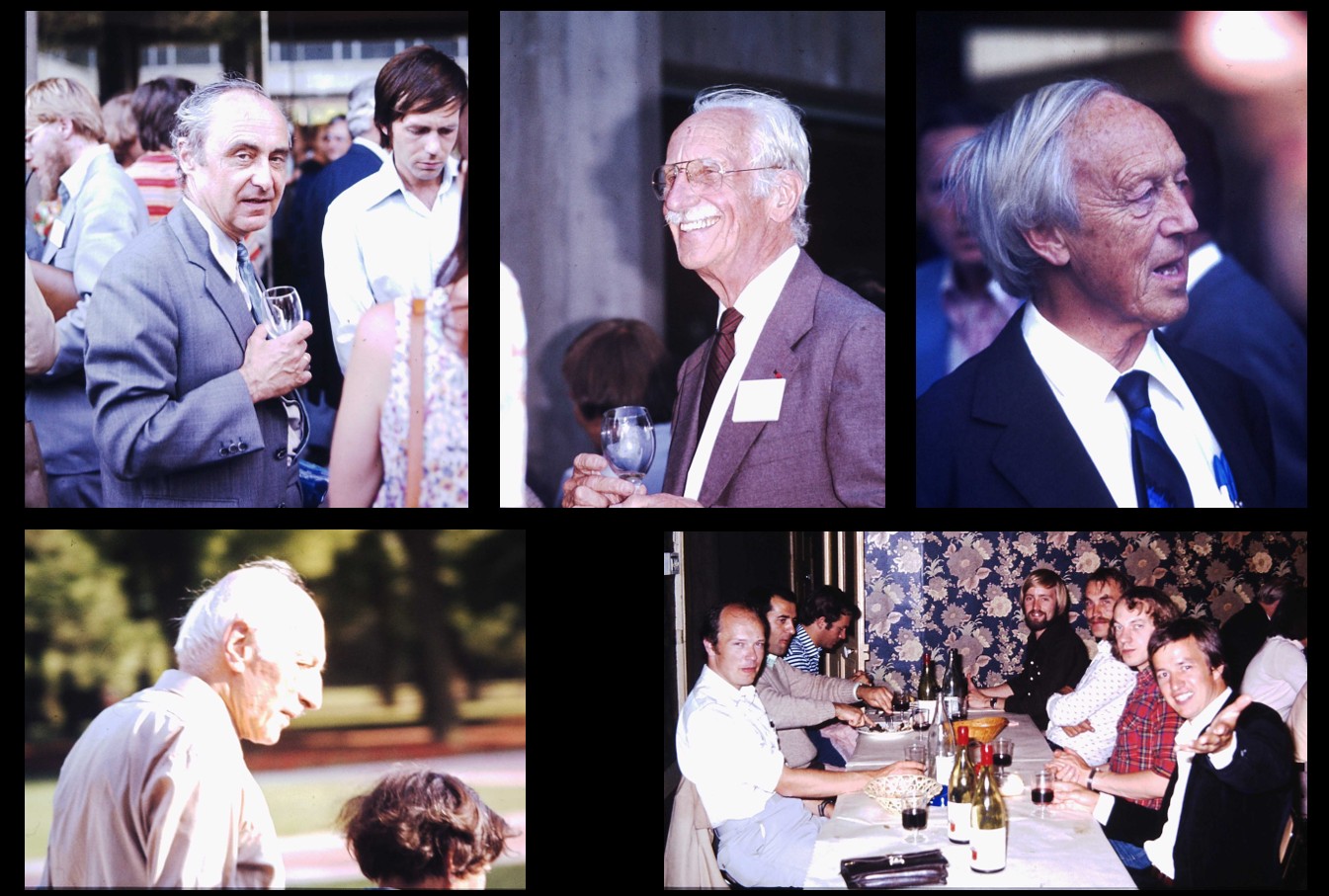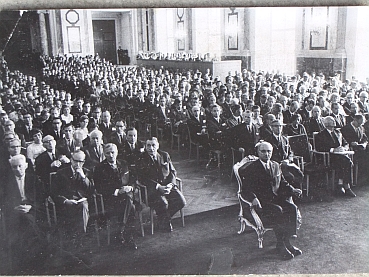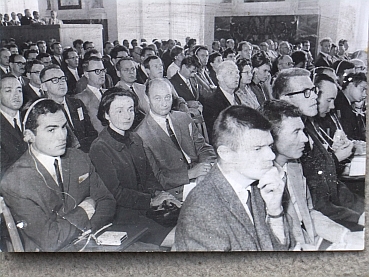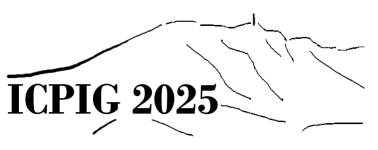ICPIGs in Eastern Europe During the Cold War, Seen by a Western Researcher
Souvenirs from André Ricard, CNRS, France
Editor's note: during the Cold War, ICPIG adopted an East-West alternation, providing a rare opportunity for scientists from both blocs to meet and exchange knowledge despite travel restrictions. Here are few anecdotes from this period by André Ricard.
Bucharest (1969)
Upon our arrival in the evening with some colleagues, everything was closed. While wandering through the city in search of a restaurant, we realized we were being followed. On the ICPIG outing day, we ended up in a huge theater, packed to the brim. It was there that I discovered an incredible pan flute player: Zamfir, who later went on an unforgettable tour in the West. On the return to the airport, we French colleagues helped share the luggage of Martha Bacal, who was leaving for France permanently.
Prague (1973)
Following ICPIG, I was invited several times to workshops in the countryside near Bratislava. During our discussions, my colleagues expressed a desire to remain socialist, for the sake of the social benefits (like crèches in factories). What they all wanted was to be able to travel freely, without the restrictions of the Stasi. After the fall of the Wall, a German colleague told me that now, it wasn’t the Stasi that held them back—but the god Dollar!
At one of those workshops, my wife wished to join me. But once she saw the remote location, she preferred to visit Prague instead. This caused significant trouble for the workshop organizers: they had to obtain the necessary permits for her to take the train and arrange her reception in Prague. I was quite embarrassed!
Once, while traveling from Vienna to Bratislava for a workshop, I was forced to refuse to open a package containing an IR photomultiplier. The Slovak customs officer insisted, not understanding English. Eventually, tired of the situation, he pointed at me and said, “doctor-doctor.” I nodded, and he let me pass.
East Berlin (1977)
After ICPIG, the University of Greifswald organized a workshop, and we traveled by steam train from Berlin to Greifswald! Leaving Berlin, some buildings were still in ruins from the war, and tanks were visible along the border. In Greifswald, we were warmly welcomed, including a sailing trip on the Baltic Sea.
The return journey was less idyllic: the train stopped halfway between Greifswald and Berlin. I was alone and didn’t speak German. I had to change trains, but several were waiting, heading to destinations I couldn’t understand. My visa was expiring that evening. Fortunately, a German advised me on the correct train to Berlin airport. A fond memory of stress!
Budapest (1985)
What struck me was the restaurant menus listing many dishes—only for the meal to end with just goulash. There was also a small museum denouncing the crimes of Imre Nagy.
Moscow ? (Editor's note:probably Minsk 1981)
The ICPIG was boycotted following Sakharov’s exile to Gorky in 1980.
Conclusion
I will always remember that ICPIG, during the Cold War period, made it possible to meet researchers from Eastern countries—I think, for instance, of Polak and Slovestkii, among others.
-----------------------------------------------------------------------
My first international conference, ICPIG in Vienna 1967
by Nader Sadeghi
I found among my old photos two pictures from the ICPIG 8th edition in Vienna, 1967. If I remember correctly, this was the opening session of the conference, with (I believe) the President of the Republic of Austria sitting alone in the front row, and all the leading figures of atomic and plasma physics in the row behind him. In the other photo, one might (or might not) recognize a young PhD student (Editor's note: Nader Sadeghi...) listening attentively to the interpreter.
At the time, photos were still taken in black and white, and general lectures could be delivered in four languages—English, German, French, and Russian—with simultaneous interpretation.
I have very fond memories of that conference, though also one major disappointment: together with my fiancée, who had accompanied me and would become my wife a few months later, we discovered that the famous Blue Danube was, in fact, very dirty and murky grey!
-----------------------------------------------------------------------
THE ICPIG in Minsk (1981)
by Vladimir Demidov
In 1981, I had an opportunity to participate in the 15th Edition of the International Conference on Ionized Gases, which was held in the Soviet Union in the city of Minsk. By that time, I had graduated from the Department of Optics at Leningrad State University (LSU) and had been working as a research fellow in the Low-Temperature Plasma Laboratory at the same university. Our university actively participated in training postgraduate students for scientific institutions in socialist countries (mainly for Bulgaria, Hungary, Yugoslavia and the GDR), but trips of LSU employees even to these countries were quite rare. Research employees practically never traveled to Western countries (with rare exceptions). Therefore, participation in the work of the ICPIG was a rare opportunity for communication between Western and Eastern scientists. However, Western scientists declared a boycott of participation in the conference (*), and only a small number of scientists from Western countries came to Minsk. I think there were about 20 of them, but I could be wrong about the number. There were significantly more scientists from socialist countries (I think a little more than a hundred, but I could also be wrong). The total number of participants was about seven hundred. That is, mainly scientists from the USSR participated. In the USSR, I had the opportunity to participate in 2 or 3 internal scientific conferences on plasma-related topics annually. They were held in various cities of the USSR, so I was able to travel to many regions of central Russia, the Baltics, Ukraine, the Caucasus, Central Asia and Siberia. Thus, I had a lot of experience in participating in scientific conferences, but in Minsk there was still an international conference, although with limited international participation. I managed to practice my English a little. I remember that Professor S. D. Wagner from Petrozavodsk provided us with great assistance in translation. He was born in the USA, but as a child he was taken to Russia by his father who went to help build socialism in the USSR with a group of enthusiasts from America. His father was immediately sent to the GULAG, but nevertheless S. D. Wagner was able (as he himself said, it took a lot of effort) to become a plasma physicist and work at the university. Somehow, he could keep English. He helped me communicate with quite a large number of foreign participants, which was certainly useful. Upon arrival in Minsk, we were placed in a student dormitory, 4 people per room. It cost, as far as I remember, three and a half rubles per day (the official exchange rate of the ruble was then, if I am not mistaken, 1 US dollar = 0.9 rubles). We did not like the living conditions in the dormitory, and my scientific supervisor Prof. N. B. Kolokolov helped us move the next day to the hotel of the Central Committee of the Communist Party of Belarus, taking advantage of the fact that his brother was the Secretary of the Central Committee. The conditions of stay there were excellent. A room cost 2 rubles per day. This hotel had a good and very cheap restaurant, where, naturally, people from the street were not allowed. The conference itself was not badly organized, although there were some blunders from my point of view. For example, we were taken to a currency bar near the conference place. At the same time, the participants from the Soviet side could not have convertible currency in principle, since it was strictly prohibited. And people from the street could not enter this bar either.
(*) Editor's note: the arrest and forced exile of Sakharov to Gorky in 1980 triggered a broad movement of support, particularly within the international community
-----------------------------------------------------------------------
Memory from ICPIG in Grenoble, 1979
by Roman Schrittwieser
I came to ICPIG 1979 to present a paper on ion wave instabilities (Grid versus plate excitation of the electron current driven ion wave in-stability) … and ended up mastering the science of the unexpected: swapping out a car starter while lying under the chassis, sleeping at a campground to stretch the budget, and having my hang glider stolen from a parking garage near the conference center ! I nevertheless enjoyed this conference in which famous names participated such as Von Engel, Hannes Alfvén, Bill Allis (MIT), and Ferdinand Cap the former head of the Institute for Theoretical Physics of the University of Innsbruck and founder of the Innsbruck Plasma Physics Department (see pictures below)
 Top, left to right: Ferdinand cap (long-year head of the Institute for Theoretical Physics of the University of Innsbruck and founder of the Innsbruck Plasma Physics Department), William Allis (MIT), Hannes Alfven (Royal Institute of Technology, Stockholm)
Top, left to right: Ferdinand cap (long-year head of the Institute for Theoretical Physics of the University of Innsbruck and founder of the Innsbruck Plasma Physics Department), William Allis (MIT), Hannes Alfven (Royal Institute of Technology, Stockholm)
Bottom, left to right: Hans Von Engel, at the table on the left, Poul Michelsen (Riso, Denmark), Gheorghe Popa (Alexandru-Ioan-Cuza University, Iasi, Romania - in the 1990-is he was long years rector of this oldest Romanian University), Siegbert Kuhn (Univ. of Innsbruck), at the table on the right Jens-Peter Lynov (Riso, Denmark), Franz Peter Stössel (Univ. Innsbruck, died in 2024 ), Jens Juul Rasmussen (Riso, Denmark) and Elmar Märk (Univ. Innsbruck, brother of the long-year rector Tilmann Märk of the Univ, of Innsbruck, and first Q-machine plasma physicist in Innsbruck - before me)





